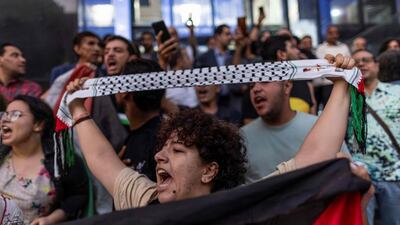Live updates: Follow the latest news on Israel-Gaza
Egyptians have reacted to the Israel-Gaza war with sympathy and support for the Palestinians, but have concerns over a potential influx of refugees as the country struggles with economic difficulties.
Egypt borders both Israel and the Gaza Strip, which has been under a "total siege" by Israeli forces since Monday, after the Palestinian militant group Hamas launched a surprise attack into southern Israel on Saturday.
The conflict on Egypt's border has captured the attention of Egyptians, with coffee shops in Cairo broadcasting live coverage of the war.
Most Egyptians who spoke to The National expressed their support for the people of Gaza, with some calling for a stronger Egyptian response after its only border crossing with Gaza was hit by Israeli shelling several times.
“Hundreds of women and children have been killed and likely more will follow them. What makes me angry most is the fact that despite three bombardments on the Rafah border crossing, Egypt’s military has not responded,” said Hassan Yehia, 38, a resident of Cairo’s Nasr City neighbourhood.
Mr Yehia is one of many Egyptians calling on President Abdel Fattah El Sisi to take a more pro-Palestinian stance in the war. Egypt has had diplomatic relations with Israel since the two countries signed a peace deal in 1979 and has co-ordinated with Israel on counterterrorism measures in recent years, but officially backs the creation of a Palestinian state.
“The state should at least expel the Israeli ambassador as a show of solidarity with Gaza,” said Salma Hamdy, 43, a history teacher at a secondary school in Nasr City.
On Wednesday, protesters reportedly chanted pro-Palestinian slogans and burnt Israeli flags outside the headquarters of the Syndicate of Journalists in Cairo.
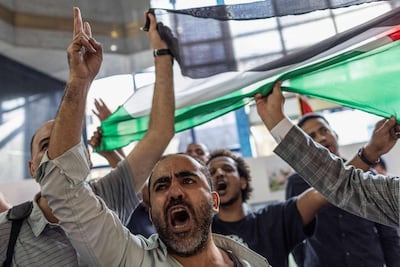
Other Egyptians said that while they did not support violence against Israeli citizens, they condemned the Israeli state's actions against Palestinians.
“I did not like a lot of the videos of the Israeli civilians being abused by Hamas, and I wish there was a way to separate my support of Palestine with my dislike of violence, but the reality is, I don’t think there is in this situation," said Habiba Gad, 28, a filmmaker.
"The Israeli state has committed unspeakable crimes against Palestinians for decades and has not been held accountable so it seems that violence has been the language of this exchange since the start,” he said.
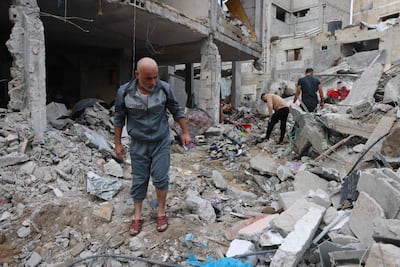
Mixed feelings on opening border
While many Egyptians sympathised with the Palestinians besieged in Gaza, there were mixed opinions on whether Egypt should open the Rafah crossing and allow Palestinians into Sinai.
The Egyptian government shut the only entry to Gaza on Tuesday.
“It’s inhumane whichever way you want to rationalise it. It’s a matter of letting people in danger through the crossing and then figuring out the politics afterwards. Some of these are women and children who have bombs falling on their heads,” Ms Hamdy said.
President El Sisi on Tuesday said that he would not allow the war in Gaza to be resolved “at the expense of others”, referring to suggestions that Gazans should be resettled in Sinai, a plan Egyptian leaders have consistently opposed.
Many Egyptians share the president’s unease about relocating Gazans in Sinai, especially given the security situation in the north of the peninsula, where the Egyptian military has been battling a low-level ISIS insurgency.
The insurgents have reportedly co-ordinated with Hamas, which is aligned with the Muslim Brotherhood in Egypt. Since coming to power in 2013, Mr El Sisi has cracked down on the Brotherhood and other Islamist groups.
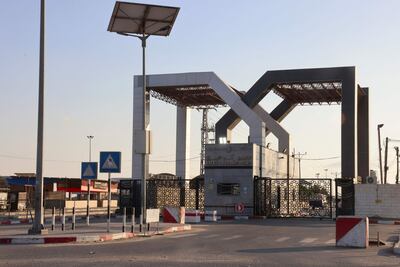
Concerns over refugees as economy struggles
Others voiced concerns about the country's ability to cope with more refugees amid soaring inflation and a cost-of-living crisis.
“Egypt has enough refugees living in it. Just over the past 10 years or so, many Syrians came here to flee their war, then many thousands of Yemenis came when war broke out over there too," said Noha El Sayed, 50, an antique shop owner in Cairo.
"Then just this year, when war broke out in Sudan, the same happened and we allowed Sudanese refugees in,” she added.
Egypt is home to nine million foreign migrants, almost 9 per cent of its population, according to a 2022 report by the International Organisation for Migration.
An ongoing economic crisis has increased the cost of living to unprecedented heights for Egyptians.
The Egyptian pound has lost half its value since March 2022, and the government is considering another devaluation before the end of the year.
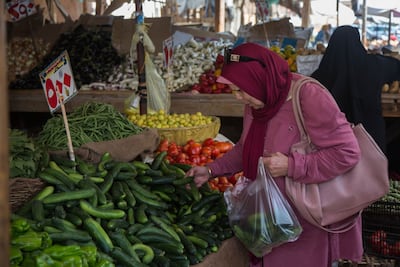
Echoes of October War
Many Egyptians saw meaning in the timing of Hamas's attack, which took place 50 years and a day after the October War of 1973, known as the Yom Kippur War in Israel.
Egyptians celebrate the October War as a victory because it resulted in the eventual return of the Sinai Peninsula to Egypt, which had been occupied after the defeat in the 1967 Arab-Israeli War.
Both the October War and the current Gaza-Israel war began with surprise attacks on Jewish holidays. Hamas launched its recent attack on Simchat Torah, while Egyptian forces took the Israeli military by surprise by attacking on Yom Kippur.
“Hamas launched its attack 50 years and a day after the October 6 victory against Israel. They look up to Egypt’s military back when it was good," Mr Yehyia said.
